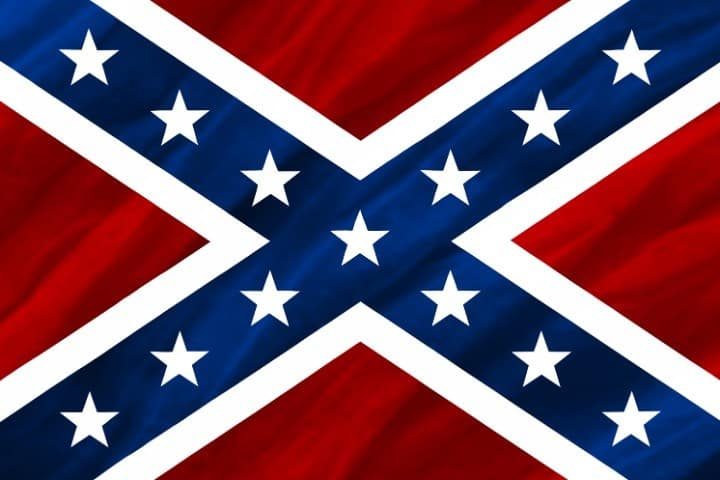
Echoing so many today, MSN.com ran this weekend the quite declarative headline, “The Confederate Flag: A symbol of hate for over 150 years.” Hate certainly was the motivator, too, when Anthony Hervey was run off the road and killed in 2015 in an incident related to that flag.
Except that Hervey was a Confederate flag advocate.
Oh, he was black, too.
“Arlene Barnum, a surviving passenger in the vehicle, told authorities and the media that they had been forced off the road by a carload of ‘angry young black men’ after Hervey, while wearing his Confederate kepi, stopped at a convenience store en route to his home in Oxford, Mississippi,” wrote the late Professor Walter E. Williams, who also was a black American, in 2016.
Hervey’s “death was in no small part caused by the gross level of ignorance, organized deceit and anger about the War of 1861,” Williams continued. “Much of the ignorance stems from the fact that most Americans believe the war was initiated to free slaves, when in truth, freeing slaves was little more than an afterthought.”
Of course, there’s much disagreement today over how great a role slavery played in the South’s secession. What’s certain is that the hapless Hervey (by the way, was his killing labeled a “hate crime”?) was not a ahistorical oddity. In fact, Williams documents the fact that many blacks volunteered to fight for the Confederacy and that the South’s black troops numbered in the thousands.
Pseudo-intellectuals and propagandists “want us to believe the flag is a symbol of racism,” the professor later wrote. “Yes, racists have used the Confederate flag as their symbol, but racists have also marched behind the U.S. flag and have used the Bible. Would anyone suggest banning the U.S. flag from state buildings and references to the Bible?”
Unfortunately, some would, and they have in recent years made suggestions of a similar nature. In fact, San Francisco decided last year to remove even Abraham Lincoln’s name from a school (along with George Washington’s). This illustrates why no one ever should have ceded any ground to those insisting on removing Confederate statues and symbols: They’re not reasonable people operating in good faith, but are hate- and power-driven civilization-destroyers bent on imposing their own Year Zero.
Dr. Williams certainly was clear on where he stood. “Black civil rights activists, their white liberal supporters and historically ignorant Americans who attack the Confederate flag have committed a deep, despicable dishonor to our patriotic Southern black ancestors who marched, fought and died not to protect slavery but to protect their homeland from Northern aggression,” he averred. “They don’t deserve the dishonor. Dr. Leonard Haynes, a black professor at Southern University, stated, ‘When you eliminate the black Confederate soldier, you’ve eliminated the history of the South.’”
This “Northern aggression” perspective may seem foreign now to many Americans; they’re raised with the notion that the federal government is supreme and the states subservient. This, ironically, breeds something akin to a slave master’s mentality. To wit: Secession is unjust revolt against a master who has rightful dominion over you.
The truth, however, is closer to the opposite: The federal government was created as an agent of the states and, as Professor Williams pointed out, you can always fire your agent. (Know also that the South was not the original hotbed of secessionist sentiment in America — New England was.)
Returning to the Confederate flag, joining the black Confederates who didn’t find it hateful would’ve been virtually all Americans who ever lived up until very recently. Why, the light-hearted, highly rated television show The Dukes of Hazzard (1979-’85), set in the South, had as one of its main stars a 1969 Dodge Charger dubbed “The General Lee,” whose roof conspicuously bore a Confederate flag image. My brother and I, along with millions of other TV watchers, enjoyed the program — and neither hatefulness nor slavery ever came to mind.
In fact, it’s likely that the most-Machiavellian civilization-destroyers don’t really view the flag as a symbol of hate, either. What may actually trouble them now that they control the central government is that the flag is a symbol of something else: resistance to total federal control.
Yet, whether propaganda or not, boiling everything down to hate is simplistic and childish and precludes deep understanding. A person can advocate a bad or good cause driven by either hatred (or some other evil motive) or a wholesome motive.
For example, a fellow three decades ago speaking about how it was impossible for women to successfully compete with men in sports was often impugned by feminists as a “misogynist.” Of course, he could have been, but he also could’ve simply been someone interested in Truth. Now that “equality” dogma has paved the way for males masquerading as females to compete in and dominate women’s sports, we see some feminists making the same case — with vigor. Suddenly, the male-athletic-superiority argument is no longer “hateful.”
As for slavery, people who hated others in ages past were more likely to kill them than enslave them. If anything, slavery was driven by greed and/or economic convenience.
Reopening 1861 wounds is silly, and anyone who does so ought to watch the end of the film The Outlaw Josey Wales (1976). When the Captain Fletcher character finally catches up with Josey Wales (spoiler alert!) — who’d previously been a member of a Confederate guerrilla group and at this point was known as “Mr. Wilson” — the audience might’ve expected a grand-finale shootout. Instead, Fletcher pretended not to recognize Wales and said to “Wilson” that when he finally finds the guerrilla fighter, “I think I’ll try to tell ’im the war is over. What do you say, Mr. Wilson?”
“I reckon so,” Wales replied. “I guess we all died a little in that damn war.”
It was a message of peace and reconciliation foreign to today’s culture-destroyers. But, of course, they’re not trying to end a war but to win one, the result of which will be not the abolition of slavery — but the institution of a new and perhaps permanent kind.



